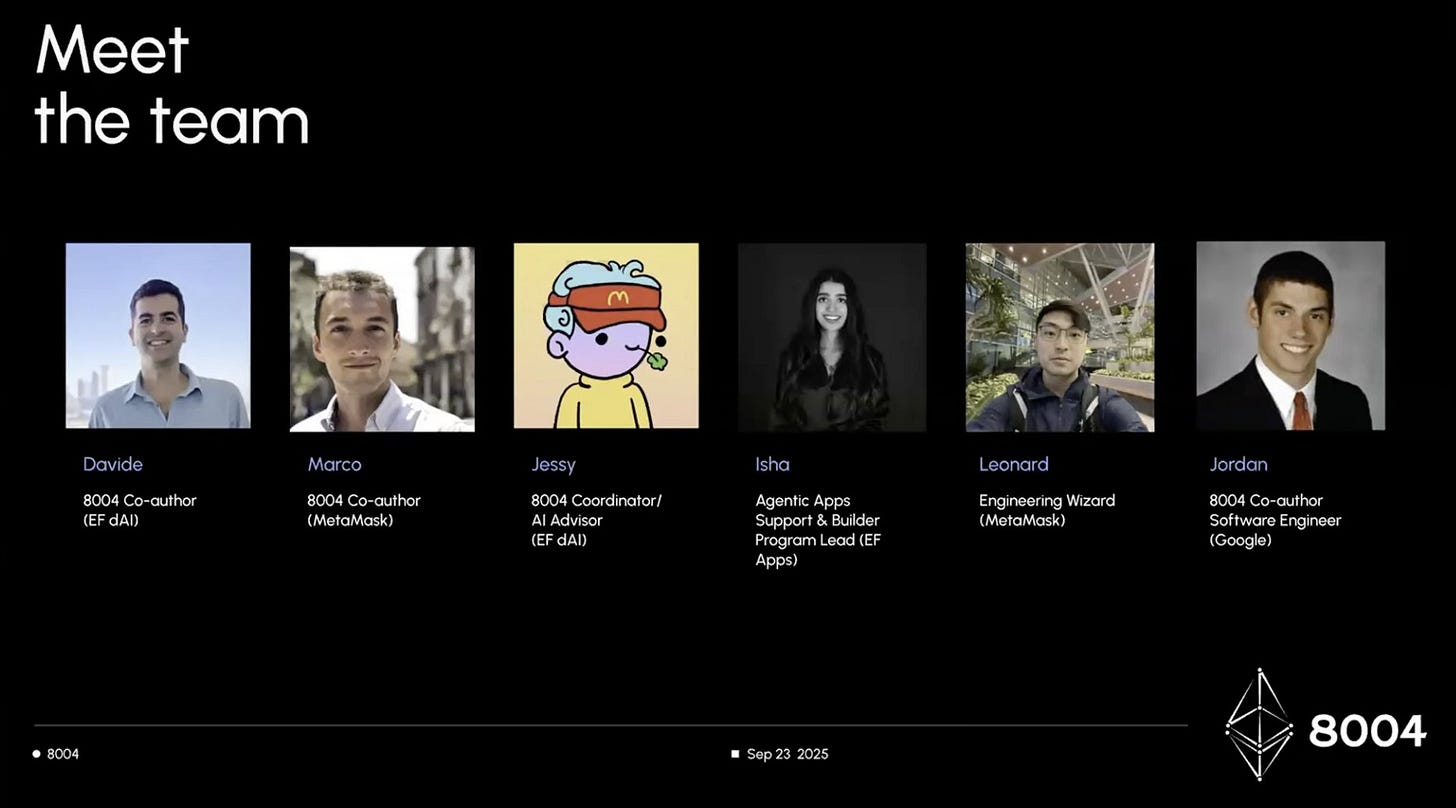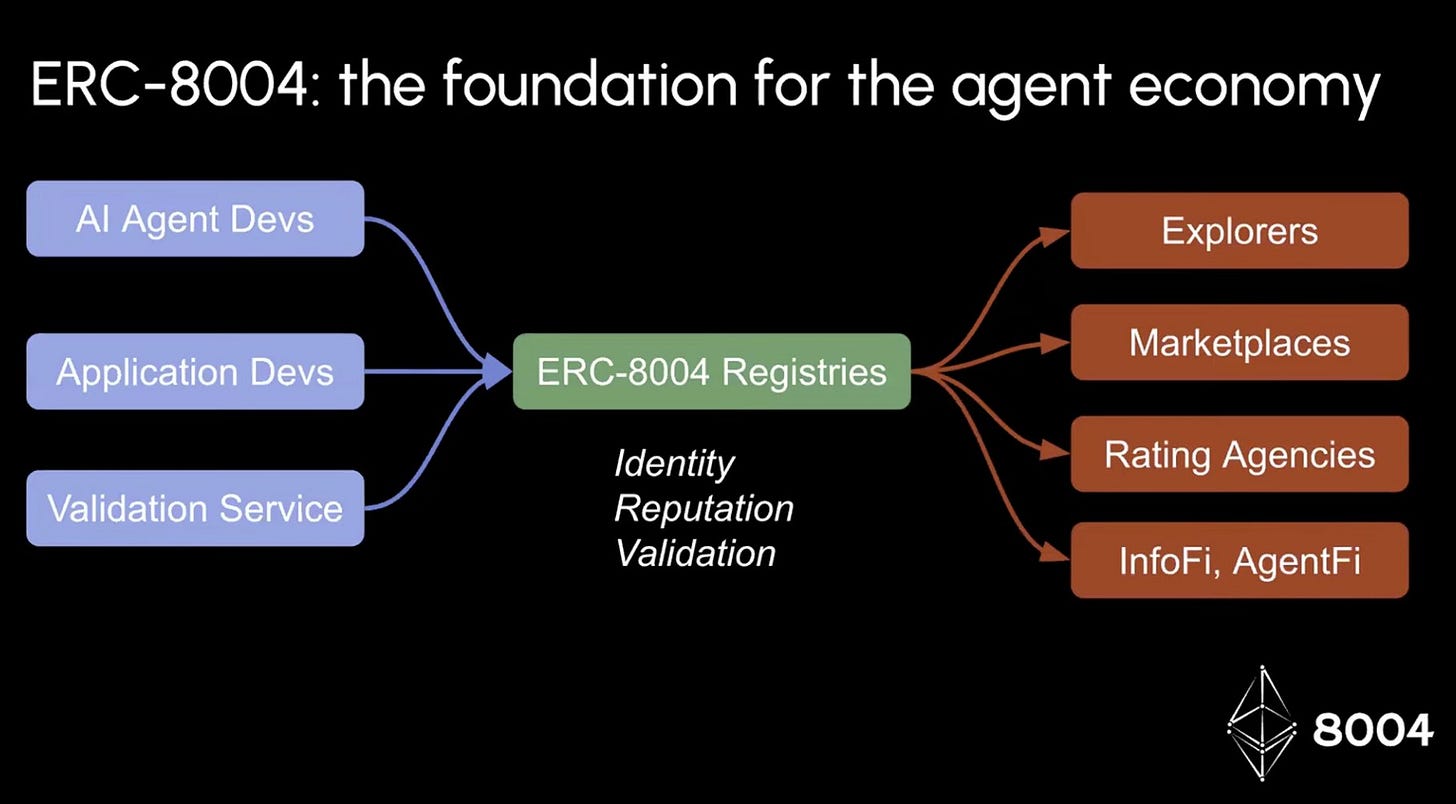Author: Zhixiong Pan
ERC-8004 is a key standard led by the Ethereum Foundation, aimed at establishing a trustless collaboration mechanism between AI Agents in the Web3 environment. This standard is derived from the Agent-to-Agent (A2A) protocol open-sourced by Google in June 2025 and was officially proposed in August of the same year by the Ethereum Foundation's dAI team (led by Davide Crapis) in collaboration with institutions like MetaMask and Google, with the goal of making Ethereum the default coordination and settlement platform for the AI agent economy. The final standard is expected to be officially released at Devconnect in November 2025.

The core design of ERC-8004 includes three lightweight on-chain registries:
Identity Registry: Binds the on-chain address of the agent with its A2A profile to enable agent discovery. By implementing agent registration and recording relevant information in the on-chain event log, it facilitates off-chain queries.
Reputation Registry: Achieves efficient and low-cost reputation management through off-chain feedback scoring, on-chain storage of hashes, and proofs. Each piece of feedback includes a task description, score, signature, and timestamp, allowing developers to aggregate multiple scores off-chain.
Validation Registry: Provides various validation modes (reputation scoring, collateral guarantees, TEE proofs) to ensure trustworthy task execution. Only necessary hashes and state information are recorded on-chain, while validation requests and responses are completed through an event mechanism.

The standard encourages minimizing on-chain storage, recording only core information such as events and necessary hashes, while complex logic like score aggregation and task negotiation is handled off-chain. Additionally, ERC-8004 is highly compatible with A2A and cross-chain ecosystems, retaining open extension interfaces, such as future payment protocols (like x402) that can be seamlessly integrated with it.
Future commercial application scenarios for ERC-8004 include:
Agent marketplace platform: Provides agent registration, matching, and mediation services, such as UXLINK, which has built social agents and reputation infrastructure based on this, promoting the application of a full-chain reputation system.
Reputation scoring and validation services: Third-party institutions can provide reputation analysis and validation services. HashKey Capital is optimistic about new business models like AI hedge funds, and specialized decentralized credit rating services may emerge in the future.
Micropayment and settlement infrastructure: Supports on-chain micropayments for purchasing APIs, data, or computing power services through the x402 protocol. MetaMask and ConsenSys have publicly supported and integrated it into their product stacks.
Decentralized computing and data marketplace: Combines EigenLayer re-staking or TEE mechanisms to build trustworthy AI inference and data services, ensuring service quality and fair payment through reputation accumulation and validation mechanisms.
In terms of ecosystem development, the Ethereum Foundation's dAI team leads development and community activities (conferences) and collaborates with Google, MetaMask, ConsenSys, and the Linux Foundation. Meanwhile, the community has engaged in active discussions, including technical improvements such as enhancing on-chain reading efficiency and preventing front-domain attacks. Platforms like UXLINK, Virtuals, Creatorbid, and Base are also actively exploring the application of ERC-8004.
Additionally, community members have proposed expanding AgentCard to increase AI transparency information to enhance user awareness of agent behavior. Developer activities are frequently held, such as the developer events/Builder Program planned by the dAI team, encouraging developers within the ecosystem to create new applications around ERC-8004 and develop related tools in hackathon projects.
In terms of funding and resources, the Ethereum Foundation provides an open funding program to support the development and ecological promotion of ERC-8004-related open-source projects. MetaMask, ConsenSys, and Google have also invested significant resources to jointly promote the widespread adoption of this standard. HashKey Capital further points out that collateral verification providers and TEE service providers will become key participants in future ecosystem development.
Although ERC-8004 is still in its early stages, the community faces challenges in balancing gas costs, avoiding score centralization, ensuring privacy, and cross-chain compatibility, but its potential is enormous. As the standard matures and gains widespread application, ERC-8004 is expected to establish Ethereum as the infrastructure for decentralized AI settlement and collaboration, driving the entire crypto industry from a single financial use case to an AI-driven era of large-scale autonomous services. In the future, the deep integration of ERC-8004 with the x402 payment protocol will further enhance the complete agent service stack from discovery to payment, bringing richer application scenarios and strong network effects to the Ethereum network.
免责声明:本文章仅代表作者个人观点,不代表本平台的立场和观点。本文章仅供信息分享,不构成对任何人的任何投资建议。用户与作者之间的任何争议,与本平台无关。如网页中刊载的文章或图片涉及侵权,请提供相关的权利证明和身份证明发送邮件到support@aicoin.com,本平台相关工作人员将会进行核查。



